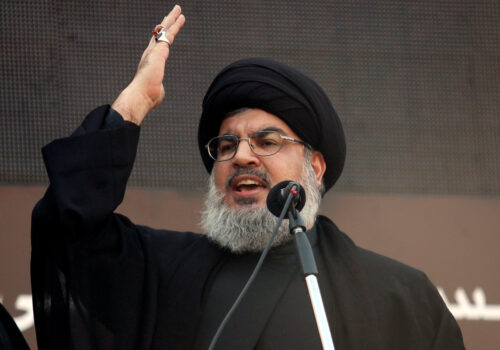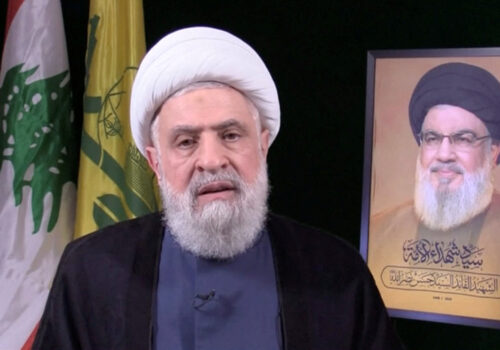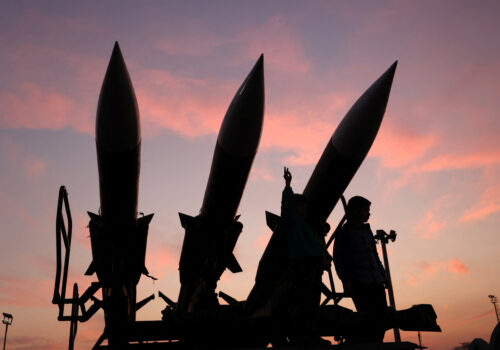Experts react: Israel and Lebanon have struck a ceasefire deal. Is the Israel-Hezbollah war really over?
Piece by piece, they’re working toward peace. On Tuesday, US President Joe Biden announced that Israel and Lebanon have agreed to a ceasefire, which is set to begin before dawn on Wednesday. It comes nearly fourteen months after Hezbollah followed Hamas’s October 7, 2023, attacks on Israel with its own rocket strikes the next day. Since then, Israel has steadily weakened the Iran-backed Lebanese terrorist group, including by killing its leader, Hassan Nasrallah, in September. Below, our experts share their insights on this ceasefire, which already faces questions about its durability, as well as its vulnerability to a maelstrom of other regional conflicts and antagonists, including Iran.
Nicholas Blanford: As a fragile ceasefire begins, Hezbollah has difficult choices to make
Gina Abercrombie-Winstanley: An enduring ceasefire hinges on how much Trump changes the atmosphere
Danny Citrinowicz: The deal is less important in its details, more in its enforcement
Gissou Nia: A ceasefire in Lebanon is necessary, and so is justice in Gaza
As a fragile ceasefire begins, Hezbollah has difficult choices to make
BEIRUT—A long-awaited ceasefire took effect at 4 a.m. local time Wednesday, bringing to a close—for now—a thirteen-month conflict between Israel and Lebanese Hezbollah. However, the ceasefire remains inherently fragile, and there is a large dose of skepticism in Lebanon that it will hold. Even within hours of the ceasefire taking effect, Israeli soldiers were firing warning shots at a vehicle Israel said was carrying “suspects” in a “restricted zone.” There are not supposed to be any “restricted zones” under the agreement. Furthermore, tens of thousands of Lebanese who fled their villages and towns in south Lebanon earlier in the conflict headed back to their homes as soon as the ceasefire came into effect, despite warnings by the Israeli military that they should not yet return. Israeli troops are still deployed in some areas of the southern border district, which makes it almost inevitable that they will come into close proximity to angry Lebanese civilians in the days ahead.
The ceasefire agreement calls for a sixty-day cessation of hostilities during which time Hezbollah is supposed to withdraw its forces to north of the Litani river, which runs anywhere between twenty-seven and three kilometers from the Lebanon-Israel border. In effect, this will mean that Hezbollah will abandon what is left of its military infrastructure and positions, although its personnel who live and work in south Lebanon will remain in their homes. The Lebanese Armed Forces (LAF) are planning to deploy an initial five thousand troops to the southern border district as the Israeli military withdraws back into Israel.
Given the scale of damage to border villages and towns as well as the southern suburbs of Beirut, Hezbollah’s priority is likely to focus on the welfare needs of its Shia constituency rather than immediately rebuilding its military capabilities. Lebanese Shias have supported Hezbollah during the conflict, but that support could dwindle if they end up spending months in tents while waiting for their homes to be rebuilt.
Israel says it is retaining the right to undertake unilateral military action if it determines that Hezbollah is breaching the agreement and the LAF and the United Nations peacekeeping force are seen to be doing nothing about it. In the past year, Hezbollah has lost much of its deterrent factor that helped keep a tense calm along the Lebanon-Israel border between the last war in 2006 and the outbreak of hostilities in October 2023. Going forward, Israel probably will not hesitate to attack Hezbollah if it believes the group is working against the ceasefire agreement. The question is whether Hezbollah would retaliate to such actions or absorb any blows inflicted by Israel in order not to revive a war that has proven costly for the organization.
—Nicholas Blanford is a nonresident senior fellow with the Atlantic Council’s Middle East Programs.
A win for the Lebanese and Israeli peoples and governments; a loss for Iran, Hezbollah, and Hamas
For Israel, in the best of circumstances, the deal provides an opportunity to have the security it has sought for much of the past two decades via United Nations (UN) Security Council Resolution 1701 being meaningfully enforced. Its failure to have been so before directly led to the current situation, with Hezbollah receiving advanced weapons transfers from Iran and using the land south of the Litani river to stage and store the weapons being fired at and threatening Israel today.
But if Tuesday’s agreement is successful, having the Lebanese Armed Forces enforce provisions related to Hezbollah not being allowed in the south—and by implication dominating the security landscape there—would further weaken Hezbollah as Israeli kinetic attacks have done for the last four months. Doing so would strengthen the position of non-Hezbollah-aligned parts of the Lebanese government, all while enabling Israeli families to return to their homes in the north after more than a year of being displaced.
At the same time, the ceasefire would give a significant reprieve to those in Lebanon who have had to endure dozens of strikes with thousands of deaths and upwards of one million people displaced.
Of equal importance, the agreement breaks the kinetic link between Hezbollah and Hamas—as the former had previously committed to keep attacking Israel until there was a ceasefire in the Strip—and undermines Iran. Tehran has seen its deterrence decline following its direct attacks on Israel last month and Israel’s elimination of Iran’s air defense systems and purported attack on the Parchin nuclear facility.
Iran is probably quietly supportive of the deal, concerned that pushing Hezbollah and the Lebanese government to oppose it would risk continuing Israeli strikes that could decimate the group, which has long been the pointy end of Iran’s regional deterrence strategy, even further. But in acquiescing to the deal, Iran risks not being able to rebuild Hezbollah’s capabilities with the same ease it did after the 2006 war, thus undermining its own regional deterrence structure.
—Jonathan Panikoff is the director of the Atlantic Council’s Scowcroft Middle East Security Initiative and a former deputy national intelligence officer for the Near East at the US National Intelligence Council.
An enduring ceasefire hinges on how much Trump changes the atmosphere
A ceasefire has been reached in Lebanon. Finally.
What was supposed to be a short sharp incursion into Lebanon by the Israel Defense Forces to mop up Hezbollah’s capabilities had begun to drag. The killing of top leaders, wounding of thousands of fighters, and overwhelming air power up to the day the ceasefire was agreed could not stop Hezbollah rockets or Israeli soldiers dying. Though Israel fights to protect its land from attack, Lebanese Hezbollah was fighting for its very land.
Even so, the combination of Israel’s success and the increasing cost to Lebanese civilians and economy, Hezbollah’s will to fight, wisely, weakened.
New guarantees should strengthen the effectiveness and longevity of the ceasefire’s foundation, UN Security Council Resolution 1701. Even its imperfect implementation in 2006 brought over sixteen years of relative peace and stability. Both sides are ready for that.
The deal’s success may rest on two important changes in perspective: First, Iran may sense an opportunity to lessen its isolation with President-elect Donald Trump, the self-described “peace” president, and be motivated to help ensure Hezbollah abides by the truce for the time being. Second, Israeli Prime Minister Benjamin Netanyahu may sense he is on a shorter leash. After all, Trump takes no prisoners. He saw Netanyahu’s willingness to repeatedly, blatantly embarrass US leadership in spite of Biden’s commitment to Israel. It can be argued that Biden’s “no daylight” policy saved Netanyahu’s political longevity, even as it undermined his own. Trump’s record makes clear he’s unlikely to make a similar error. His stature and reputation for strength is his priority, and the prime minister would be wise to stay in his good graces. Support for Israel does not require support for Netanyahu.
There is now space for another look at Gaza. While mostly silent on the conflict, Trump has given no indication that he believes the continuing carnage is the best Israel can do. Like Richard Nixon opening China, there is reason to hope he will try another way.
—Gina Abercrombie-Winstanley is a nonresident senior fellow at the Scowcroft Middle East Security Initiative of the Atlantic Council’s Middle East Programs and at the Scowcroft Center for Strategy and Security. Abercrombie-Winstanley served as the US ambassador to the Republic of Malta and as special assistant for the Middle East and Africa to the secretary of state. Her Middle East assignments included election monitoring in the Gaza Strip and an assignment where she supported gender equality in the Kingdom of Saudi Arabia as the first woman to lead a diplomatic mission there.
The deal is less important in its details, more in its enforcement
After more than a year, Israel and Lebanon have reached a ceasefire agreement that effectively ends the war that Hezbollah began on October 8, 2023, in its attempt to force Israel to stop its campaign in Gaza.
Israel has made significant achievements in this war. Chief among them is the elimination of the organization’s leadership and the severing of the Gordian connection between Lebanon and Gaza in a way that dramatically weakens the ethos of the Iran-backed Axis of Resistance. But the truth must be told: Hezbollah has indeed been beaten, but it has not been dismantled, and it is still the strongest organization in Lebanon militarily and politically.
Both Israel and Hezbollah wanted the agreement in light of the understanding that the failure to reach it during the Biden administration may dramatically prolong the war, which is not in the interest of any of the parties.
But the future of the agreement will not be determined by its clauses or the side letter that the US administration will give to Israel. Instead, it will be decided by Israel’s willingness to go all the way in an attempt to prevent Iran from rebuilding Hezbollah’s capabilities. Rebuilding Hezbollah is a necessity for Tehran in light of the dramatic damage to Iran’s deterrence caused by Hezbollah’s weakness.
For Lebanon, the hope is that the weakness of Hezbollah and especially the death of Nasrallah will lead to a strengthening of the moderate forces in Lebanese politics. The first test of this prospect will be the appointment of a new president for the country. The military and political weakening of Hezbollah opens the door to significant changes in the Middle East, such as the potential weakening of the Syrian component of the Axis of Resistance and strengthening of the Lebanese Armed Forces into a dominant force.
And yet, the determining factor will be whether Israel is willing now—unlike its more relaxed approach after the 2006 war in Lebanon—not to allow Hezbollah to rebuild its forces. That is the biggest question mark regarding this agreement.
—Danny Citrinowicz is a nonresident fellow with the Atlantic Council’s Middle East Programs and a member of the Atlantic Council’s Iran Strategy Project working group. He previously served for twenty-five years in a variety of command positions units in Israel Defense Intelligence.
A ceasefire in Lebanon is necessary, and so is justice in Gaza
News of a ceasefire brokered between Israel and Hezbollah in Lebanon is certainly welcome news. However, an unfortunate feature may be France’s apparent bartering of justice in the process. Early reports indicated that Netanyahu was blocking French involvement in a potential ceasefire in Lebanon unless France promised to decline to act on International Criminal Court (ICC) arrest warrants against Israeli officials. This appeared to be confirmed when the French Foreign Ministry released a statement, curiously timed just hours after the announced ceasefire, that said France would consider what “immunities” apply to Netanyahu and Israeli ministers in evaluating France’s compliance with ICC arrest warrants. The quid pro quo was reportedly confirmed by an Israeli official.
France’s position is a stark about-face from its statements just days prior, affirming that it would comply with its obligations as an ICC member state. And those obligations are crystal clear: All ICC member states are required to cooperate fully with the Court, including in the arrest and surrender of individuals sought by the court where those individuals are on their territory. Article 27 of the Rome Statute addresses the “irrelevance of official capacity” and provides that head-of-state immunity does not apply at the ICC. A recent decision from an ICC Pre-Trial Chamber following Russian President Vladimir Putin’s visit to ICC member state Mongolia and Mongolia’s failure to surrender him, puts a finer point on the matter. It expressly holds that Article 98 of the Rome Statute—which France invoked in its statement following the ceasefire—does not provide immunities for heads of state from non-ICC member states.
France’s position is made all the more incoherent given that its own national courts have held that Syrian dictator Bashar al-Assad does not enjoy head-of-state immunity in France. To then balk at long-established principles of immunity before international courts when it comes to Netanyahu is a cynical example of political horse trading.
To be sure, history has seen moments of tension between the aims of international justice and peace processes, most notably in negotiations for amnesty of some officials. But to use justice for victims in Gaza as a bargaining chip for a stand-down of weapons in Lebanon, and to the detriment of France’s long-standing commitment to the international-justice project, is nothing to celebrate.
—Gissou Nia is a human rights lawyer and the director of the Atlantic Council’s Strategic Litigation Project.
Further reading
Sat, Sep 28, 2024
Experts react: Hassan Nasrallah is dead. What’s next for Hezbollah, Israel, and Iran?
New Atlanticist By
On Saturday, Hezbollah confirmed that its leader had been killed in an Israeli air strike. Atlantic Council experts share their insights on what might come next for the already war-torn region.
Tue, Nov 5, 2024
Naim Qassem is finally the bride
MENASource By
Hezbollah will not moderate or shift its primary loyalties to Lebanon under its new soft-spoken secretary-general.
Wed, Nov 20, 2024
Dispatch from the desert: Trump’s first global test is Iran
Inflection Points By Frederick Kempe
Iran hasn’t been this weak in decades. But does the US president-elect sense this opportunity and want to explore whether a major deal is possible?
Image: An Israeli soldier gestures from a tank, amid cross-border hostilities between Hezbollah and Israel, by Israel's border with Lebanon in northern Israel, November 26, 2024. REUTERS/Ayal Margolin


